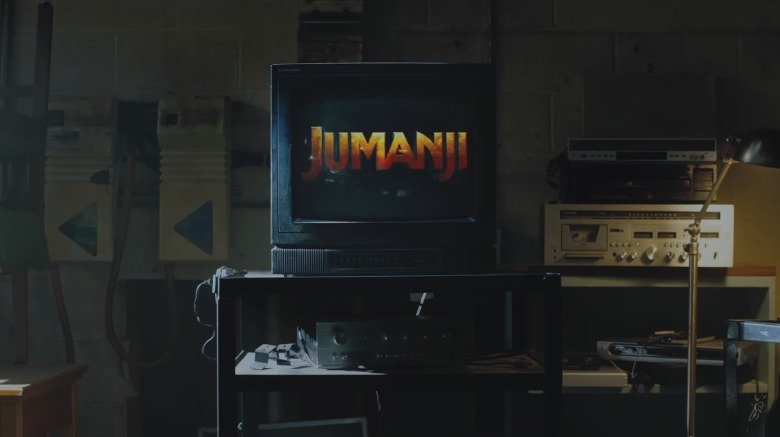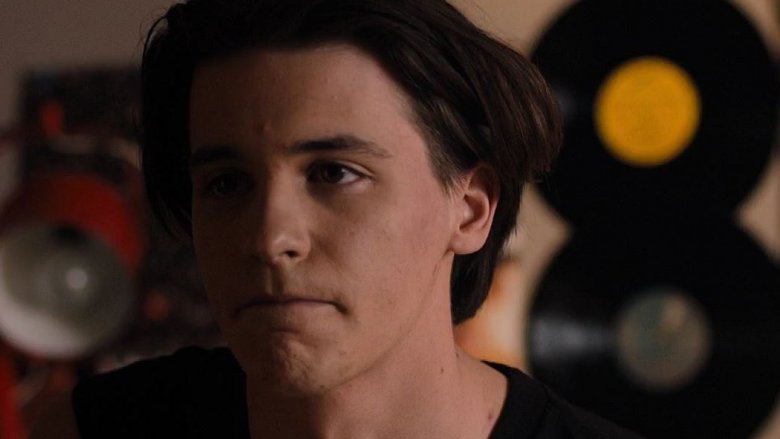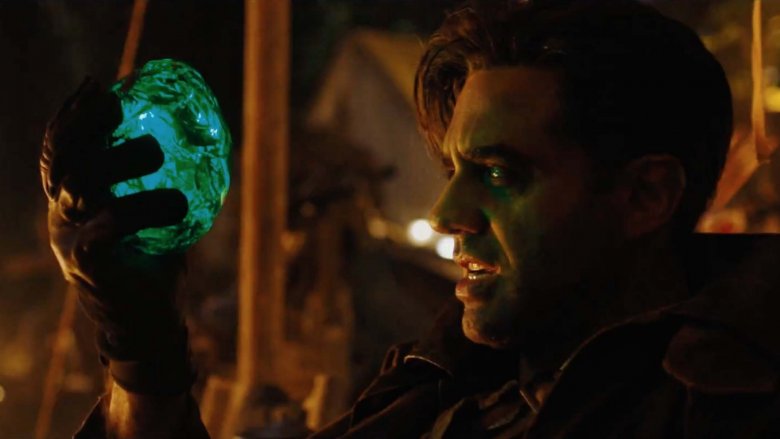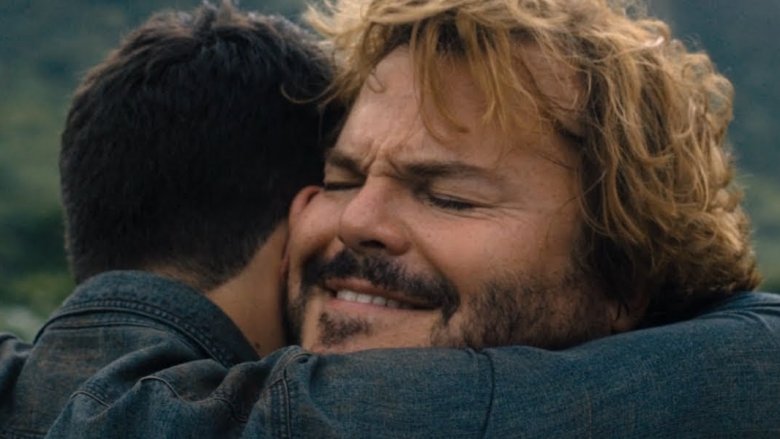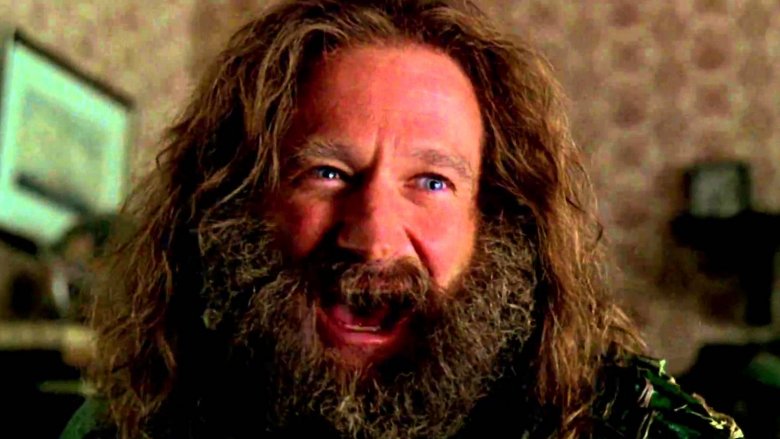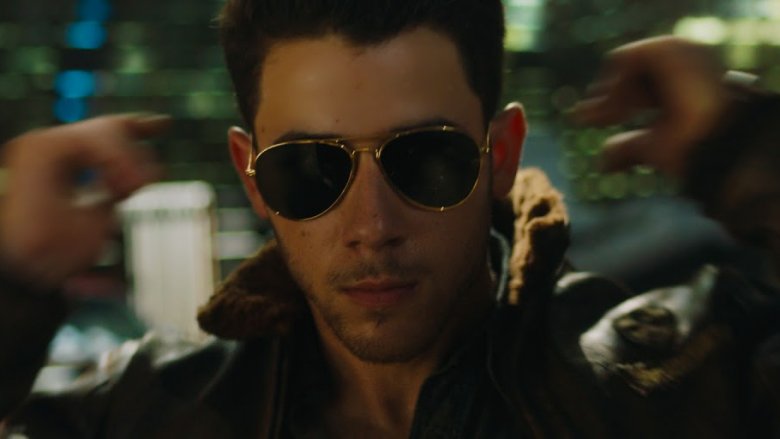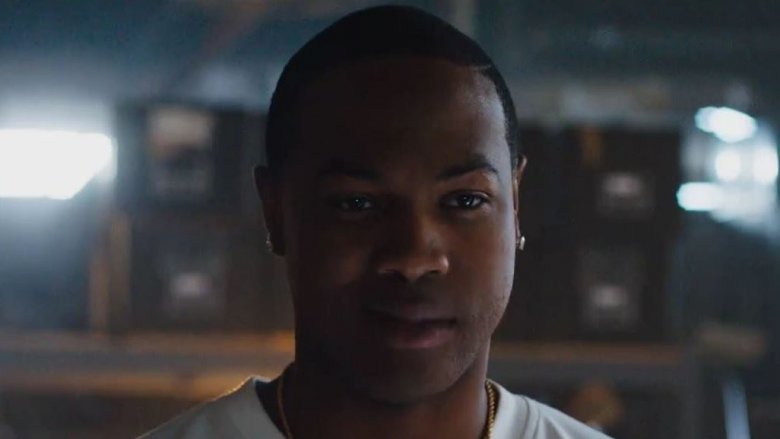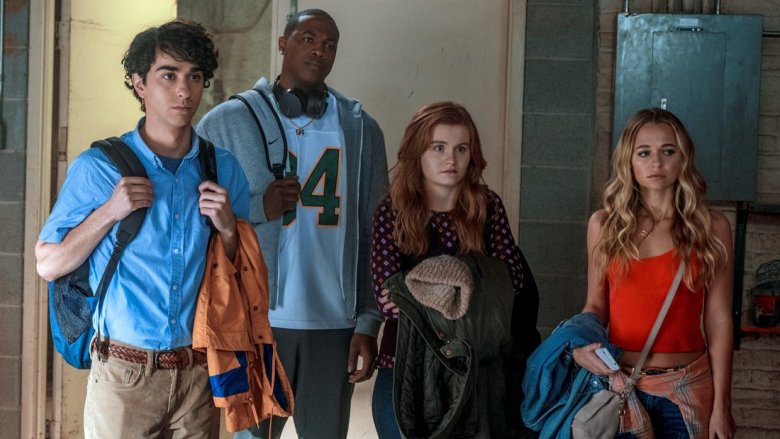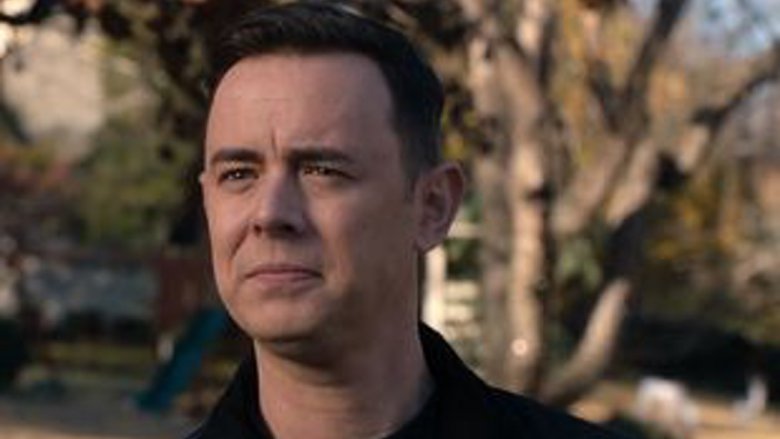Jumanji: Welcome To The Jungle Details Only Adults Notice
Jumanji: Welcome to the Jungle turned out far better than anyone had any right to expect. What initially sounded soulless and cynical ended up being a massively successful, well-received, family-friendly thrill ride for kids and adults alike. Starring Dwayne Johnson, Kevin Hart, Jack Black, and Karen Gillan, the movie effectively built on the 1995 story about a magical board game with a video-game-based, body-swap comedy sequel.
Welcome to the Jungle made a lot out of a wacky premise. But even if the belated Jumanji follow-up is wonderfully entertaining, that doesn't mean it's without its weird quirks and drawbacks. Many of its idiosyncrasies won't be picked up by younger viewers, and while none of them really impede the enjoyment, for those who were kids when the first movie came out in 1995, there are some noticeable flaws that can't be unseen once they're spotted. Here are some of the things you only notice about Jumanji: Welcome to the Jungle as an adult.
Umm, what gaming system is that?
Jumanji opens in 1996, and we're quickly introduced to a teenage boy whose bedroom is covered in pop culture ephemera like all teenager's bedrooms in movies. Nothing says "1996 teenager" like his quick dismissal of the Jumanji board game his father gives him in favor of his trusty PlayStation controller. We see he's playing Twisted Metal, a game that was released November 5, 1995. But just when we pause to marvel at the obvious research that went into such authenticity, we get a good look at the console itself. Spoiler alert: that's no PlayStation. Its closest twin is hilariously the Atari 2600, a console so much older that anyone who was consuming pop culture in 1996 would immediately notice and snicker. And the controllers go from PlayStation to vaguely Nintendo-esque when the kids pull it out at the school. Hilariously, they can make heads nor tails of this odd contraption either.
Alex is too old for this level of childlike wonder
It's common for characters in a story to be slightly dimmer and less alarmed by danger than the average person. But usually a movie will do its best to work with us. For instance, in the original Jumanji, Alan (Robin Williams), Peter (Bradley Pierce), and Judy (Kirsten Dunst) were all considerably younger. It made sense for them to be less cautious.
Alex is about 16 or 17, yet he never questions the fact that a board game magically transforms into a game cartridge for his franken-console overnight, nor the drums and the green light emanating from the case that woke him up. He just pops Jumanji in without a second thought and promptly gets sucked into the game. As viewers we accept it because the comedy adventure needs to get under way, but if we're honest with ourselves, the grumpy "over it" teenager we were introduced to in the scene before this would probably be a bit more hesitant.
Lampooning (and repeating) video games' treatment of women
It seems to be a common belief that simply acknowledging that something relies too heavily on clichéd tropes is enough to subvert said trope, but that's rarely the case. Jumanji uses Martha as a mouthpiece to criticize the skimpy outfit worn by her avatar, Ruby Roundhouse. But at the same time the film is making this commentary on female game protagonist design, it benefits from having a young actress dressed in an unnecessarily skimpy outfit. Luckily, the film is brimming with charm, and doesn't rely too heavily on sexy shots of Karen Gillan, preferring to have her project silliness over sultriness. In fact, she adds bits of her male companions' outfits to her own in order to feel a bit more comfortable as she journeys through the jungle kicking bad guy butt with her dance fighting techniques. Still, it's an extremely noticeable instance of Jumanji wanting to have its cake and eat it too.
They dropped the cutscene conceit
Just after encountering the first NPC of the game, Nigel Billingsley (Rhys Darby), the kids are shown the backstory of Jumanji via a cutscene. This informs the kids that the object of the game is to return the jewel of Jumanji to the jaguar shrine and avoid the man who stole it, corrupt researcher Russel Van Pelt (Bobby Cannavale).
Van Pelt shows up periodically to berate and give orders to his underlings. The thing about video games is, any time the player character isn't on the screen and the bad guy's side of the story is being shown, it's done through cutscene. But since this is a movie that has to show the audience the whole story while keeping Spencer and the other kids in the dark, they never revisit the cutscene mechanic again. This dynamic implies Van Pelt's a sentient being who these teenagers erase from existence when they win the game. It really is kill or be killed in the jungle.
A believable little teen romance
One could argue that Jack Black is the heart of the ensemble, playing Bethany with empathy and honest enthusiasm for life. The movie could also be commended for its restraint when employing jokes about his body and his looks. Obviously Bethany is none too pleased to have an avatar that looks like a "fat old guy," but once the initial freakout is over, she just goes about working with her new friends to get home. She positively delights in some aspects of operating a male body. She's kind and enthusiastic and sweet. So when Alex shows up in the teen dream avatar of Nick Jonas, their flirtation feels organic even though she's being played by Jack Black. Her level of sacrifice is fully felt when she uses one of her lives to save Alex. It's kind of odd rooting for puppy love to blossom between Black and Jonas, but they only have their genuine performances to blame.
A touching homage
At the midpoint in the film, when the teens have been set upon by Van Pelt and there's no obvious way forward, Alex shows up in the avatar of Jefferson "Seaplane" McDonough (Nick Jonas). He leads our heroes through a hallway full of timed traps to his little hideaway set apart from the main Jumanji playing area. Even though he's been holed up there since he lost all but one of his lives, he explains to Spencer, Fridge, Bethany, and Martha that the little bungalow where he lives off of delicious margaritas is not a structure of his own making — it once belonged to an Alan Parrish. Alan is, of course, the late Robin Williams' character from the original Jumanji. It's a lovely tribute and a moment when the film establishes that no matter the mode of getting to Jumanji, whether by board game or video game, it's the same place essentially.
Alex's anachronistic slang
"She's pretty fly." "She da bomb." "I'm sure they'd like to get jiggy with her." These quotes and a reference to Cindy Crawford as the pinnacle of hotness get the teens to realize that the Alex they've found in Jumanji is Alex Vreeke, who's been missing — and stuck in Jumanji — for 20 years. It's not a bad idea to use outdated slang in this way, but there are a few problems here. One is that Will Smith's "Gettin' Jiggy Wit It" came out in 1997, not 1996. The next problem is that if they were going to go there with that style of slang, they probably should have adjusted their characterization of Alex from the beginning of the film. Instead of a Metallica tee, he should probably have been wearing a Cross Colours tank top, and the walls of his bedroom should have been covered in new jack swing and Michael Jordan posters. Self-described metalheads didn't say anything was "da bomb."
Young Fridge doesn't act anything like Kevin Hart
The fact that the teen version of Anthony "Fridge" Johnson, Ser'Darius Blain, doesn't attempt to mimic Kevin Hart's mannerisms is obvious as soon as they land in Jumanji and Kevin shows up onscreen, but it's made even more abundantly clear when the kids go back to their normal lives at the end of the film. This is the most perplexing thing, since the filmmakers clearly wanted this to be yet another vehicle for buddy comedy BFFs Hart and Johnson. They could have specifically searched for an actor with the physicality that they were looking for who had a decent impression of Kevin Hart in his back pocket. Maybe Ser'Darius was specifically directed not to emulate the comedy star in his performance, but considering the effectiveness of the other stars' close match to their young counterparts' performances, it seems odd for director Jake Kasdan to go in the opposite direction for Fridge.
Fridge doesn't have an arc
Speaking of Fridge, another glaring fact is that he had no real arc. Things start off promising, if a bit trite. We learn that he's asked Spencer to do his homework so he can stay on the football team, but Spencer churns out a McPaper that's easily sniffed out by his teacher, and Fridge is kicked off the team.
When Fridge and Spencer's tension comes to a head on a cliff in Jumanji, they get into a shoving match costing Spencer one of his lives. By working together through the rest of the adventure, they gain a mutual respect, but at the end of the movie, the problems that led to that confrontation are still there. Bethany gets wanderlust and takes an interest in the world outside herself. Spencer gets the nerve to take a chance and kiss Martha, and Martha gets over her shyness enough to kiss him back. Fridge gets to be "the tall one" in his new friend group.
Alex coming back creates a paradox
Happy endings are the best, especially in family movies. But the implications of Alex returning to the moment of his disappearance after being trapped in Jumanji for 20 years would be considerable. His disappearance from this small town was a major cultural touchstone for everyone who lived there. It's mentioned multiple times by different characters at the start of the film. Everyone is just a little more cautious because Old Man Vreeke, who was once vigorous and full of life, lost his son mysteriously one fateful night. But nope! After the film's final act, that never happened, which means that the timeline Spencer, Fridge, Martha, and Bethany were living in was winked out of existence and replaced by this new world where Alex never went missing. Maybe that's why Fridge wasn't all that upset about his football fate — perhaps in this new timeline, he was never kicked off the team!
